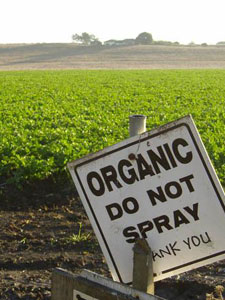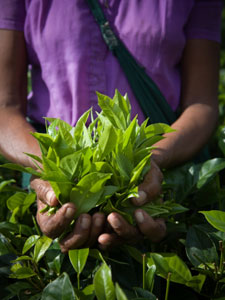Organic, Fair Trade, and Kosher teas


In recent years we've seen an explosion of claims and certifications on the foods we consume. In this lesson we'll discuss the complexity of Organic, Fair Trade, and Kosher certification.
It is not the desire of TeaClass to judge or sway your decisions concerning what you put in your body. Convincing you to drink or not to drink organic tea, for example, is not the aim of this course. Therefore, we'll stick to the plain facts on the issues, and give you a deeper understanding so you can determine the proper choice for you.
Organic
To begin, one must understand what makes a product organic. The USDA tells us that organic foods are those that are "produced without using most conventional pesticides; fertilizers made with synthetic ingredients or sewage sludge; bioengineering; or ionizing radiation." In other words, Organic foods must use very little chemicals during the growing process. In addition, the soil that the products are grown in must be free and clear of the same chemicals. To ensure this, farmers must let their fields lay fallow (unused) until they reach an acceptable level. As most farmers in tea growing regions are too poor to be able to afford the privilege of not making money off of their fields for years at a time, most of the tea that is produced worldwide is not certified "organic".
While "organic" does have real meaning and environmental value, it is not focused primarily on the quality of the tea and does not come with guarantees. Organic Certification controls the inputs and the process and strives to protect the environment but does not involve any testing or verification after the tea is produced to determine whether the rules were followed. Because there are no quality standards for the final product, organic certification also does not guarantee that there are no environmental pollutants or contaminants during processing or packaging. It's important to buy from growers, distributors and retailers that you trust, regardless of their certifications.
Being "certified" organic is also a rather complicated process. There are hundreds of different agencies internationally that certify products as organic. Each agency has different standards, and some certifications are accepted in one country, but not others. For example, some products considered organic by the European organic association will not be considered organic by the USDA. Undoubtedly, these complications are due to political reasons as well as health concerns. It is natural to be suspect of a tea company that boasts a foreign "organic" sticker. But, on the other hand, there is no significant scientific proof showing that it is dangerous to drink a tea that is not organic. More importantly, because of the bureaucratic complexity of certifications and the small size of most premium tea producers, many teas that would qualify as organic are never formally certified.
Fair Trade
Often accompanying the "Organic" title for many teas is the socially responsible label, "Fair Trade". This is a separate certification process, independent of how the product is grown. Fair Trade is based on the assumption that the market price paid to tea growers/laborers is not fair and does not promote sustainable living environments. In this way, Fair Trade is to the local economy and the worker what Organic is to the environment and the plants.
A Fair Trade premium of between $0.50 and $1.50 per kilogram (2.2 lbs) of tea is charged by the grower. In addition, the growers pay a certification fee in order to gain Fair Trade status. These premiums and fees go directly into the pockets of the laborers, towards developing programs at the local level, and towards funding the certification process, the Fair Trade operational structure, and marketing the Fair Trade brand internationally. For comparison purposes, the Fair Trade price for coffee is $1.35 per pound.
Producers must apply for certification through one of several Fair Trade Organizations (FLO, IFAT, NEWS, EFTA, etc.) that require adherence to the following criteria:
1. Fair Labor Conditions: wages, working conditions, and living conditions
2. Direct Trade: no middlemen adding unnecessary costs
3. Community Development: investment in services and/or infrastructure to aid the community
4. Environmental Sustainability: agricultural methods that are "healthy"
5. Transparency: free association of workers and farmers and democratic decision-making
Because many tea gardens are small, family affairs without the means to participate in community investment or adhere to extensive bureaucratic documentation and auditing rules, the vast majority of specialty tea producers are not "Fair Trade" certified. In truth, these programs and processes are best suited for the giant tea estates that produce the 97% of global tea supply, which is commodity grade and harvested and processed by machine. In some countries, like Japan, no Fair Trade teas can be found because the tea workers are already paid far above the poverty level. This would be akin to demanding a Fair Trade wine from France.
Because the "Fair Trade" sourcing options are very limited, Adagio prefers to get involved directly at the source. While we support the IDEAS behind Fair Trade, we believe that, currently, the best way for us to raise the living and working standards of the growers is to introduce Americans to premium loose leaf teas. Premium teas fetch premium prices and require significant additional human involvement. The result is higher wages, more employment, and better tea for all of us! In addition, we buy all of our teas directly and choose our producing partners based, in part, on their business practices. Finally, we contribute directly to the well-being of the farmers through programs like our Roots Campaign. As Adagio grows, our purchases result in meaningful changes in the lives of our producing partners and their employees.
Kosher
Another issue that the tea industry faces exists on a more spiritual realm - Kosher certification. Luckily for most tea companies, teas are considered naturally kosher. Because most teas do not include any man-made additives, they are automatically regarded as Kosher, though each must be blessed by a Rabbi to be certified as such. This is not true, however, for most flavored teas. As many of these teas use flavorings or other additives, these teas may require additional steps to be certified. With Kosher certification as well, there are an abundance of agencies, each with their own version of what should and should not be certified Kosher.
It is important to note that, while all these certifications focus on an aspect of tea quality, none of these say anything about the most important aspect in judging the quality of tea: taste. For example, while products that tout the title "Organic" may taste better, the fact that they are organic really has nothing to do with their quality.
When you choose your next cupful, whether it be a tea that is certified Organic, Fair Trade, and Kosher or a plain, non-certified tea (or anything in between), remember that there are many variables involved in the quality of the product. Always try to blend your beliefs with all the information that you can find, and don't forget about your taste buds.
A rich life, full of tea, is just a sip away.
 teaclass
teaclass
